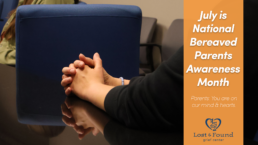Every year in the United States, approximately 37,000 children die before reaching their eighteenth birthday. Deceased children of any age and their grieving parents are the focus of Bereaved Parents Month in July. Bereaved Parents Month aims to raise awareness about the grief parents experience following the death of a child.
“Parents are not supposed to outlive their children. It is not the natural cycle of life,” said Melanie Blair, assistant executive director at Lost & Found Grief Center. Blair is a bereaved mother herself, having lost her son Charlie to complications from bacterial meningitis in 2018.
“While the death of a child is devastating, at Lost & Found, we tell people, ‘The worst grief is your grief,’” Blair said. “So, whether you are grieving the loss of a young child, an adult child, a spouse, or a sibling, the steps to take care of yourself or what you can do to help someone you care about are similar.”
How to take care of yourself when you are grieving the loss of a child:
- Sleep, drink water, eat nutritious food, and exercise. You cannot feel better if your body does not feel good.
- Understand that grief is a natural response to the death of a loved one. While losing a child is not normal, grief is a natural reaction to the death of a child.
- Do not put a time limit on your grief. Grief lasts as long as it lasts.
- Seek professional help. Grief can be incredibly lonely and isolating—attending therapeutic grief groups or individual counseling like that offered at Lost & Found Grief Center can help ease the feelings of isolation.
How to support someone who has experienced the death of a child.
- Don’t just offer to help – find a way to help. Mow the lawn, care for pets, make a grocery run, or clean their house. You cannot take away their pain, but you can ease some of the burdens of everyday life.
- Avoid “at least” sayings, such as “At least they aren’t suffering anymore” or “At least they died peacefully.” Their child is dead, and the well-meaning attempts to make the parent feel better may only end up making them feel worse.
- Say their child’s name. A parent may fear that their deceased child will be forgotten, so speak their child’s name.
- Hold space for the grieving parent. You don’t have to say anything, but a caring presence can help ease someone’s grief.
- Do something to honor their child’s memory. A donation or act of kindness in their child’s name will mean a great deal to a grieving parent.
It is also a good idea to encourage friends or family members who have lost a child of any age to seek professional grief support. Lost & Found Grief Center offers therapeutic grief support groups at no cost to the families it serves.
For more information on Lost & Found’s therapeutic grief support, visit lostandfoundozarks.com or call (417) 865-9998.
###
Contact: Mark Miller, Lost & Found Grief Center, Executive Director, (417) 839-2886, mmiller@lostandfoundozarks.com

